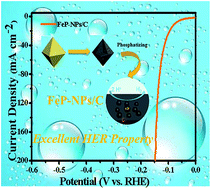Metal organic framework (MOF) derived iron phosphide as a highly stable and efficient catalyst for hydrogen evolution†
Abstract
Herein, a facile and universal strategy for preparing metal phosphides using metal organic frameworks (MOFs) was designed and a highly efficient hydrogen evolution reaction (HER) catalyst was developed. By employing MIL-101(Fe) as the precursor, through carbonization, in situ reduction and a direct phosphating process in the presence of NaH2PO2, carbon-coated FeP nanoparticles (FeP-NPs/C) with a large specific surface area (114.3 m2 g−1) were successfully synthesized. When applied for HER testing in 0.5 M H2SO4 solution, the catalyst exhibited superior HER activity with an onset overpotential of 23 mV, a Tafel slope of 72 mV dec−1, an exchange current density of 0.925 mA cm−2 and an overpotential of 72 mV at a current density of 10 mA cm−2, which were comparable to or even better than those of most of the catalysts reported so far. Moreover, it exhibited no obvious decay after 1000 cycles in a long-term durability test.



 Please wait while we load your content...
Please wait while we load your content...